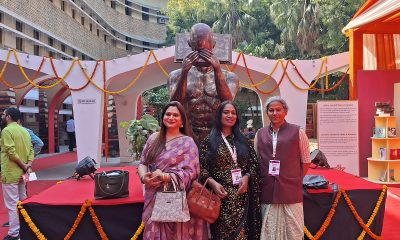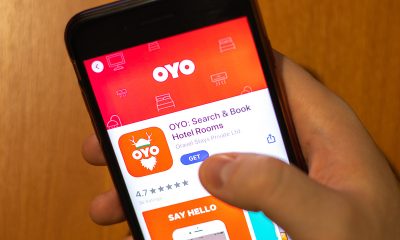Miscellaneous
Bollywood films increasingly explore LGBTQ+, intersex issues
Actress Celina Jaitly has appeared in U.N. ‘Free and Equal’ campaign
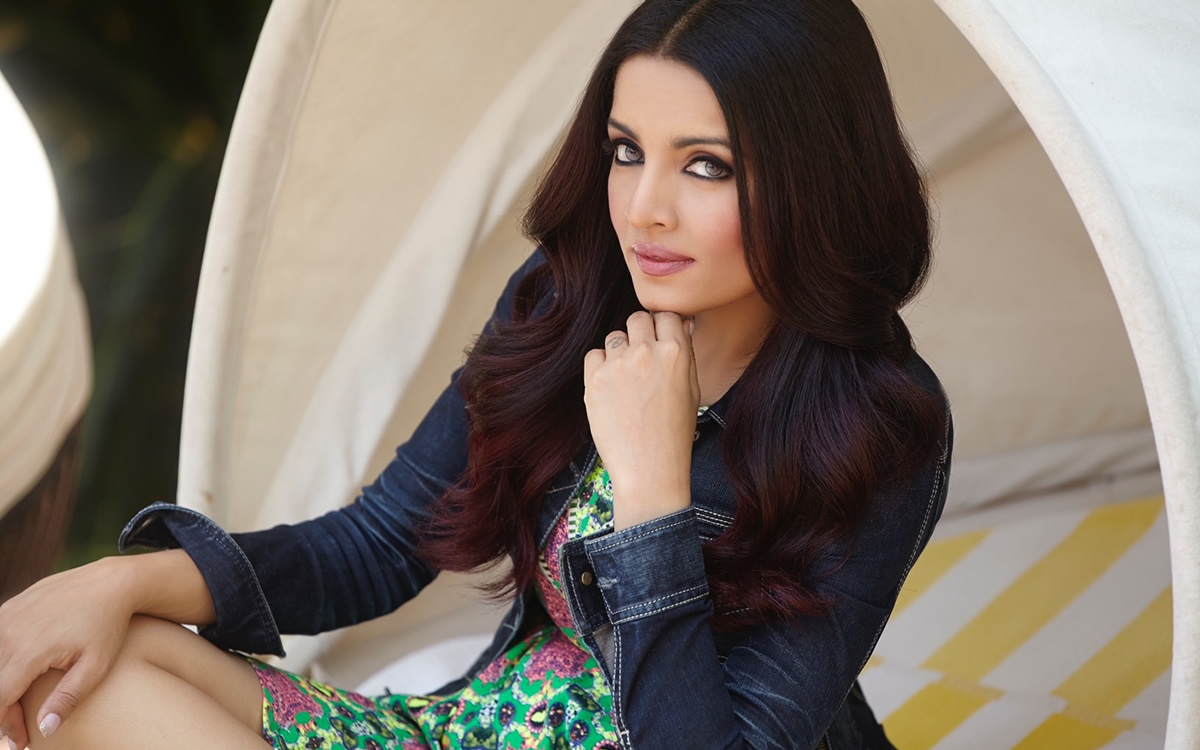
MUMBAI, India — Music, dance, color, compelling stories and drama: Welcome to the world of the Indian film industry.
With the production of more than 1,500 films every year, the industry is the largest in the world. Movies like “Dangal,” a 2016 film about wresting, impacted Indian society’s views towards girls. In a country with limited awareness of Tourette’s syndrome, the 2018 film “Hichki,” which means “hiccup” in Hindi, successfully sensitized audiences.
But the Indian film industry before 2015 failed to highlight an integral part of Indian culture: The LGBTQ+ and intersex community.
The 1971 movie “Badnam Basti,” which means “Infamous Neighborhood” in Hindi was dubbed as India’s first gay film. The movie disappeared into oblivion soon after its release, and the 35 mm film print was only recently discovered in a Berlin archive. The Central Board of Film Certification, a film certification body under the Indian government’s control, in 1971 certified the film as A-rated, meaning for adults only. According to Hari Om Kapoor, the son of “Badnam Basti” director Prem Kapoor, the film never explicitly showed homosexuality but implied it through scenes.
When India was going through a tumultuous time in 2004, and the political landscape was changing, “Girl Friend” appeared on large screens.
Although it was not the first lesbian feature film, it portrayed a lesbian character as evil and stereotypical. The film explored a love triangle between two girls’ best friends and a man. One girl — Tanya, who played by one Bollywood’s biggest stars, Isha Koppikhar, soon realizes she is in love with her best friend, Sapna, who Amrita Arora plays. But Sapna is in love with a man, Rahul, played by Ashish Chaudhary. When Rahul realizes that Tanya is too close to Sapna, making him uncomfortable, he vindicates Tanya for the troubled relationship. The film then ends with the gruesome murder of Tanya by Rahul and Sapna, portraying Tanya and Rahul as heroes, and a lesbian character, Tanya, ends up becoming evil. This film received poor reviews from film critics.
“Indian cinema has played an important role in conditioning the mindsets of Indians of all backgrounds, and while the recent it has made great leaps in the types of cinema being attempted, most Hindi films still thrive on the offensive and stereotypical portrayal of the non-binary gender characters,” said Celina Jaitly, a former Miss India and one of the most popular Indian actresses.
Jaitly, through her performance in various big films, won millions of hearts in India and globally. Her activism in India for LGBTQ+ and intersex equal rights attracted the endorsement of the U.N. High Commissioner for Human Rights, which in 2013 made her an Equality Champion. Jaitly has supported the U.N. Free and Equal campaign to counter homophobia and transphobia.
“I have always wondered as an actor, why a gay or a Trans person is constantly seen as outside the bounds of ‘normal.’ Ironically, despite the rampant transphobia, one particular trope is extremely popular in Bollywood, even after so many years, and that is cross-dressing men,” she told the Washington Blade. “Trans people are abnormal but cis men in drag are applauded. Every time a ‘hero’ dresses in drag it is considered to be iconic piece of performance, it’s always been difficult to wrap my head around that one. Casting Trans and gay people in Trans roles is still a challenge as cisgender actors consider it as a loss of opportunity to win awards, and producers/directors would rather cast cis actors who pull in an audience rather than a trans or a gay actor who pulls in the character.”
Jaitly, who have worked in the Indian film industry for more than a decade, appeared in “Seasons Greeting” last year in which a trans person is the lead actress.
Jaitly said she has fought for LGBTQ+ and intersex rights in India for years, and the reason for which she agreed to work in “Seasons Greeting” is that the director Ramkamal Mukherjee cast a Trans woman for the first time in a Trans lead film. Jaitly told the Blade that she believes in the importance of Trans/gay cast in a Trans/gay role, and only they can and should portray and become the beacons of reflections of the agonies and ecstasies of their journeys no matter what the script.
“Filmmakers hold supreme responsibility in being sensitive, empathetic, and rational while attempting to make films on the said theme,” said Jaitly. “And as complex, as it may seem, the underlying principles of treating people respectfully and equally is a no-brainer and requires no special education. Cinema like literature is the reflection of society and not only does it influence the society but has great impact on successive generations.”
In 2008, the star-studded romantic comedy film “Dostana,” which means “friendship” in Hindi, also attracted criticism and praise for depicting a gay couple.
Hollywood sensation Priyanka Chopra played a central role, with megastars like John Abraham and Abhishek Bachchan. The film explores the world of two men living in Miami who pretend to be a gay couple so they can live with a charming girl (Chopra), and they both eventually fall in love with her. Many critics argued that the film mocked LGBTQ+ and intersex people and making fun of the serious subject. But some critics also said that the presence of megastars like Chopra helps make audiences feel comfortable about the issue.
The Blade reached out to Chopra for a comment, but the actress did not respond.
With the advent of cheaper mobile data in India after 2015, more people are aware of LGBTQ+ and intersex people, and the Indian film industry is making LGBTQ+ and intersex-based films more than ever.
Maanvi Gagroo, a prominent Indian actress, in an email to the Blade said that there was hardly if any, LGBTQ+ and intersex representation in Bollywood for the longest time. And whatever little there was, was almost always comedic. Gagroo believes comedy can be a great tool for social change.
“it was always the manner or the nature of the humor that was problematic for me. Often the jokes were at the cost of the gay/queer characters, and audiences were meant to laugh AT them rather than WITH them. These characters never had any sort of redemption, no arc and often created and/or perpetuated outlandish, garish stereotypes!” said Gagroo. “There is hope though. I see makers becoming much more sensitive towards the community. And this change is parallel in society as well. I mean we only decriminalized homosexuality a few years ago. Now whether Bollywood is mirroring society or vice versa, I can’t comment but the change is positive for sure.”
Gagroo’s first LGBTQ+ and intersex film was “377 AbNormal,” is based on the Indian Supreme Court ruling in 2018 that decriminalized homosexuality. The film explored the five people who challenged Section 377, a colonial-era law that criminalized consensual same-sex sexual relations.
“‘377 AbNormal’ was actually very educational for me. While I pride myself as an ally, I was completely ignorant about the journey of the movement and what led to the monumental verdict of 2018. I knew I had to be a part of the film from the time I first heard the concept,” said Gagroo. “Again, that was another film where the director, Faruk Kabir, was extremely cautious of not only getting the film factually right but also portraying the entire process sensitively. We would often choke up and would have to stop shooting because all of us would get so emotional.”
“In terms of preparation, I didn’t need to work on sensitizing myself on the topic,” added Gagroo “I was there. I was ready to tell that story and I felt I had to do it well without minimizing anyone or anything related to the film.”
Although “377 AbNormal” was the first LGBTQ+ and intersex film for Gagroo, it was not the last.
Gagroo in 2020 appeared in “Subh Mangal Zyada Saavdhan,” a film that Hitesh Kewalya directed.
The film explores the story of a gay couple who have trouble convincing their parents to accept their relationship. The film generated a buzz at the box office. While talking about the film, Gagroo, who also starred in it alongside megastars like Ayushmann Khurrana, Jitendra Kumar, veteran actress Nina Gupta, and Gajraj Rao, said that the film came with empathy and a respect and that the intent of the film is clear.
“Our director, Hitesh Kewalya, was very clear right from the start, that he didn’t wish to delve into the gruesome hardships that the gay community is subjected to, but aim to normalize a lot of the conversation around it,” said Gagroo. “It dealt with so many different social issues even beyond LGBTQ. Even while shooting you could see the cast and crew evolving and their growing comfort with the topic was palpable.”
While talking with Blade, Kewalya said that things changed, and people became more aware of the issue, which led to the making of “Subh Mangal Zyada Saavdhan.” He argued the Section 377’s abolition made it possible to make such films. Kewalya also noted that Indian society was already talking about the issue, so making such a film became easy.
“It was challenging because there was no precedent to it. In a commercial film like this, where a top star is headlining the film, and a top production house is backing it, and all the great actors backing it,” said Kewalya. “It was also challenging because it is a sensitive topic in our society. Even the LGBTQ community was never happy with the kind of representation that was happening in the cinema.”
According to Variety, India produces films in staggering 41 languages, mostly regional. In 2017, Lokesh Kumar released “My Son is Gay,” a Tamil language film. The story revolves around a school principal and her only son. The mother-son duo shares a strong bond, and the mother soon finds out the hard truth that her only son is gay, which leads to a drastic change in her life.
“I am glad many people supported and showered a lotta love for our little indie feature film ‘My Son is Gay.’ I have attended an LGBTQ film festival once, where I have seen many queer films across the world and also got to meet many community members. That’s when I realized there are only very few Tamil films which showcased queer characters and there are no full-length gay-themed films as such,” said Kumar. “I really felt the need to tell the stories like ‘My Son is Gay.’ So, I have decided to meet LGBTQ members and their parents and did my research, wrote the story which is based on many real incidents. It wasn’t an easy journey at all, as there were very less support from people around me considering the theme of the film. Many actors and technicians were hesitant to involve. There weren’t many producers who wanted to back this project. However, producer Anil Saxena, an Indian citizen who lives abroad, Cyril D’souza and actor Anupama Kumar understood the importance of this story and they backed me. Finding the right cast and making the cast, crew understands the importance of such stories and making them confident and comfortable to play the characters was really a challenge. Am glad I didn’t give up.”
While LGBTQ+ and intersex films are doing well in India and globally, in 2022, another film, Junglee Pictures’ “Badhaai Do,” generated a buzz among the masses. Star-studded films with casts like Rajkummar Rao, actress Bhumi Pednekar, Sheeba Chaddha and Chuma Darang helped the film highlight the LGBTQ+ and intersex issues in India. The film tells the story of a gay cop who enters into a sham marriage with a lesbian teacher to convince their family that they are living a normal life.
“The films that came before us had already placed the LGBTQIA+ issues and concerns in the mainstream space. Not having the burden of explaining an ‘issue’ was liberating for us as we could focus on aspects of representation while negotiating with our own heteronormative conditioning without worrying about having articulate and politically correct sounding characters,” said “Badhaai Do” director Harshavardhan Kulkarni. “It helped us locate the film in familiar realities of caste, class, and patriarchal family units. I feel that too often, we tend to gloss over the fact that sexuality is only one aspect of our being, and it exists within the many other aspects which govern daily life in large parts of our country. I feel that we need to do more to understand and educate ourselves about this. Until we do that, our understanding of the real-world problems faced by the LGBTQIA+ community will remain limited.”
In recent years, the Indian film industry has released some critical films that show real-world issues of the Indian LGBTQ+ and intersex community. Films like “Badhaai Do,” “Subh Mangal Zyada Saavdhan” and many more have not only created an impact on Indian society but also started the discussion.
Samantha Ruth Prabhu, an Indian film star who won millions of hearts across India and numerous awards for her contribution to Indian cinema, told the Blade that Indian movies and the film industry are constantly evolving.
“I do believe we have a long way to go before mainstream films refrain from crudity, insensitive humor and homophobia completely,” said Prabhu. “I am extremely proud of having been a part of a path breaking and ambitious film like ‘Super Deluxe.’ The film tied many intricate stories to an overarching philosophy, so I wouldn’t say it was only about a transgender person. The characters portrayed by me and Mr. Vijay Sethupathy (an actor who appeared in ‘Super Deluxe’ with Prabhu) were similar in that they both exhibited their own brand of bravery.”
Prabhu has joined the cast for her next LGBTQ+ and intersex film, Arrangements of Love. Wales-based BAFTA-winning director Philip John is also joining the team as director. The film will revolve around an Indian man in Wales who visits his homeland to find his estranged father. Prabhu will be playing a bisexual detective who becomes part of the search.
“The industry is evolving-slowly but surely. There was a time when people were forced to tuck away a very real part of themselves in the way they told their stories, in a bid to conform. That thankfully has changed,” said Prabhu. “Directors and scriptwriters are being more real, and the audience is here and ready for it!”
Ankush Kumar (Mohit) is a freelance reporter who has covered many stories for Washington and Los Angeles Blades from Iran, India and Singapore. He recently reported for the Daily Beast. He can be reached at [email protected]. He is on Twitter at @mohitkopinion.
Miscellaneous
Gay bar in California bans MAGA gear — but no other political expression — from its premises
MAGA is a terrorist threat to the LGBTQIA+ community
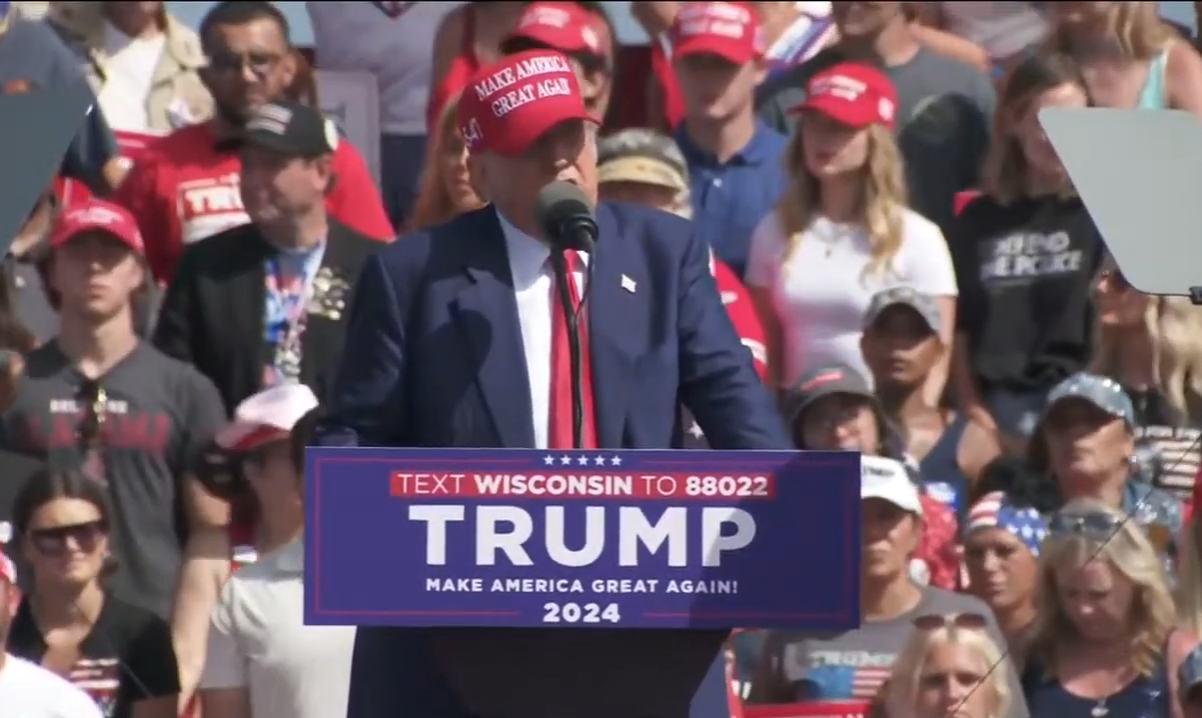
Do not let anyone bait you into a “both sides” argument on this topic. Trans people can confirm that we no longer live in a country where freedom of expression exists in the first place, so the point in and of itself is moot. Don’t waste your energy.
But especially don’t be shamed by those who imagine themselves to be more enlightened than you as they make the tired false equivalence that MAGA is just another political ideology that deserves the same freedom of expression as liberal points of view.
The owners of the Badlands Bar are keeping their patrons safe from terrorism. Yes, MAGA is a terrorist threat to the LGBTQ community. Oxford’s definition of terrorism is “the unlawful use of violence and intimidation, especially against civilians, in the pursuit of political aims.”
It’s too long a list for this article, so here’s a link to a running tally of the government’s actions against the LGBTQ community since Jan. 20.
It started, on Trump’s first day as president, with trans people being forcibly stripped of their very identity — and with it, all protections — under the law. This trend has continued, ominous drip after ominous drip of frequently illegal Executive Orders that dehumanize, disenfranchise and dismantle the basic rights and dignities of trans and queer Americans. If you’re following the Project 2025 playbook, as the federal government is, you’ll notice that ending marriage equality is quickly coming up on MAGAs To Do list.
All of that—the bullying, the emotional and psychological abuse, the stripping of rights, the (eventual, inevitable) tearing apart of families—is violence, by definition. The anxiety you feel every day as an LGBTQ American? That’s intimidation. And that is why living under MAGA as an LGBTQ person means living in a terrorist state.
Perhaps the idea that MAGA perpetrates outright terrorism seems dramatic, especially for those who remember 9/11 and maybe we don’t need to add more drama to this historical moment.
Then let’s consider the terrorism of words and ideas.
Stochastic terrorism, is a particularly nasty form of political expression, where those with cultural power spout hostile rhetoric about a group, creating a culture of hate that inevitably — but not directly — results in violence. When we talk about haters becoming emboldened by Trump’s rhetoric, this is the dangerous potential that absolutely does become reality.
The insidious part of stochastic terrorism is that there’s plausible deniability on the part of the instigators. Truly, who do we blame for the murder of Lauri Carleton in Lake Arrowhead, CA?
Do we blame the individual who shot her after he screamed epithets about the Pride flag she flew in front of her store? Or do we blame the talking heads and podcast hosts who were then spending untold airtime equating LGBTQ people with pedophilia and grooming? Or do we blame the governors who sought to ban the flying of Pride flags in public, for turning them — and all of us who fly them — into high-profile lightning rods for hate? Who should be charged in a court of law for this hateful crime?
If any comparison to terrorism still seems too far-fetched to you, even for MAGA, then let’s consider the term “gang.”
Flip all the racist rhetoric you’ve passively absorbed about the kinds of people most likely to be in a gang, and consider Donald Trump, the current Republican Party, and MAGAs specifically as you read the following definitions of what a gang is.
According to the Department of Justice:
- Gangs adopt a group identity in order to create an atmosphere of fear or intimidation.
- Gangs are typically organized upon racial, ethnic, or political lines and employ common names, slogans, symbols, hand signs, or style of clothing.
- The gang’s primary purpose is to engage in the use of violence or intimidation to enhance or preserve its power, reputation, or economic resources.
If we hold MAGA to the DOJ’s gang standards it so easily fits into, perhaps we can more easily hold that most businesses explicitly bar gang symbols from their premises, often as an easily-enforcible safety measure, and consider the Badlands Bar owners’ actions in that context.
But if you’re still suspicious of any of this rhetoric, then all that’s left is to consider the reality of MAGAs actions, which owners of LGBTQ bars around the country experience on a regular basis.
On Feb. 22 at Scorpio, in Charlotte, NC: an exception made to a “no political affiliations of any kind” dress code, devolved into the individual making transphobic remarks at the entertainers during the drag show. He refused to leave when asked and became aggressive toward security, resulting in police intervention.
On March 14 at the Chatterbox Jazz Lounge in Indiana, MAGA hat-wearing patrons aggressively misgendered and harassed a bartender and were ejected. The video of the altercation went viral; the owner reports his bar has since received several threats of arson and bodily harm.
Four days after the video of that incident went viral, the Chatterbox Tavern in Tennessee received threatening emails and phone calls.
These incidents were flashpoints that reported, often by MAGAs claiming victimhood. Untold incidents go unreported due to intimidation or uninvestigated due to bias. According to GLAAD’s 2022-24 ALERT Desk Report, over 1,850 anti-LGBTQ incidents were reported across all 50 U.S. states. That’s more than 600 acts of vandalism, bomb and mass shooting threats, assaults, and cases of arson per year — nearly two per day. These incidents have resulted in at least 161 injuries and 21 deaths. The perpetrators — when apprehended or known — wore MAGA gear, screamed MAGA slogans, had shared MAGA rhetoric online, or were members of MAGA-associated groups like the Proud Boys, Q-Anon, Three Percenters, Libs of TikTok and Moms for Liberty.
If after all of this — and the rest yet to come — you still believe that MAGA simply represents an opinion about a stance on taxes, individual liberties and the size of government, then this author will be the bigger person and acknowledge your identity as part of America’s inherent Diversity, wholeheartedly Include you as an Equal in this vast multiplicity to which we belong called America.
And then ask you, if it’s all directly equivalent: when will MAGA do the same for LGBTQ people?
Of course you are free to wear your red hat and shirt wherever you please — your gang runs this place, after all. You’ll even be pardoned for violence you commit, like the Jan. 6 terrorists and your poster boy Kyle Rittenhouse. Don’t fret.
But don’t expect us not to protect our own just because we’re a bunch of queers.
The author of this Op-Ed wishes to remain anonymous for safety reasons, given the nature of the issues discussed. Citations are linked to GLAAD’s expert resources, but this Op-Ed was not written by anyone affiliated with the organization.
Arts & Entertainment
Mr. BarBareians 2025 is crowned!
Precinct DTLA was home to the first-ever Mr. BarBareians competition, celebrating sensuality and queerness.
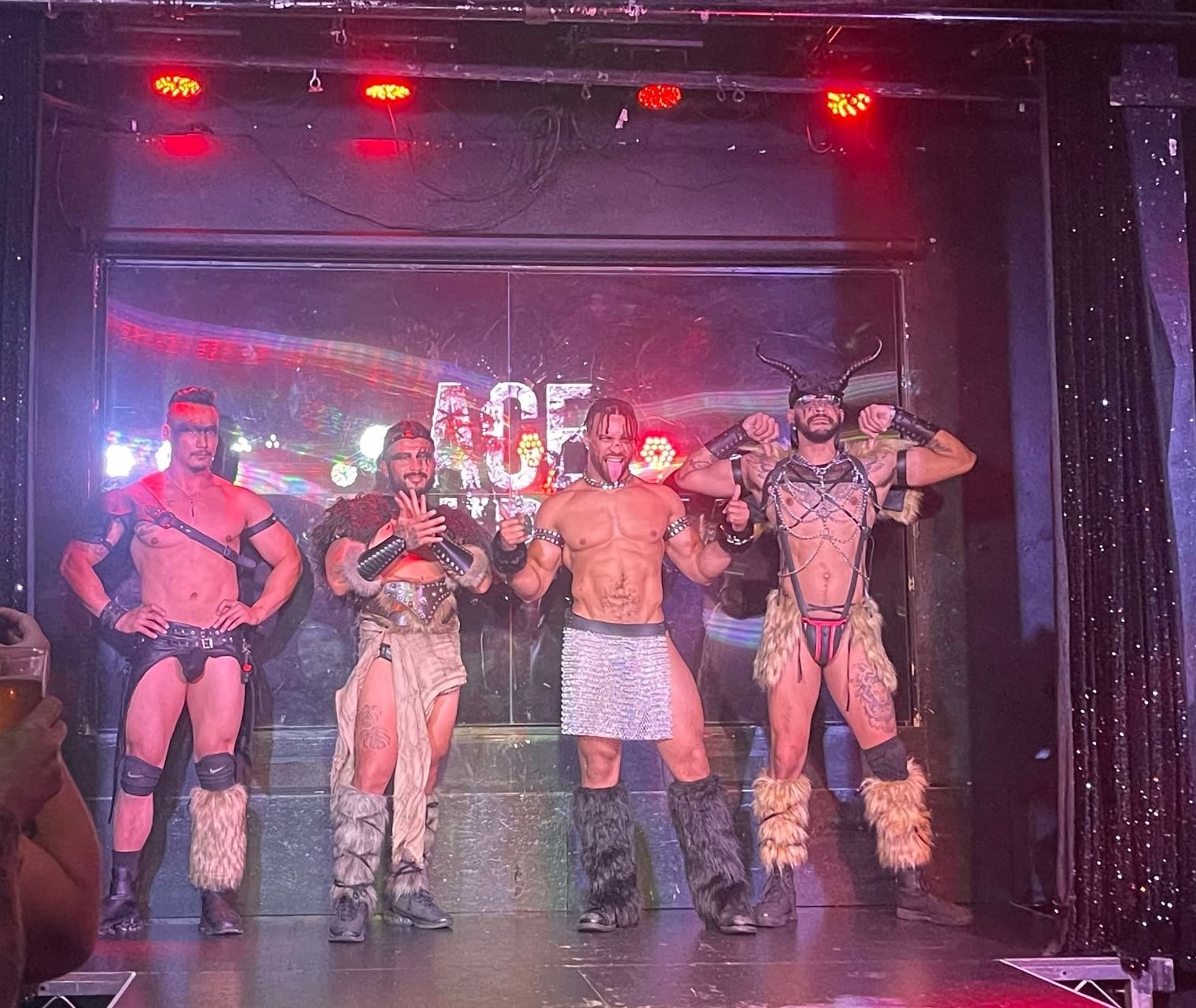
Last weekend Los Angeles Blade was on the scene and one of the guest judges alongside Los Angeles personalities from the adult and nightlife world including Meatball, Dean Michaelz, Adam Keith, Mr. Sister Leather 2024, Colin MacDougall and Mr. Precinct Leather 2024 to crown the first ever Mr. BarBareians at Precinct DTLA.
The Mr. BarBareians is a nod to the male beauty pageant, just a bit edgier and dare we say, sexier? Four contestants competed against each other in a series of categories that included talent, walk, pose, looks and Q&A.
The pageant’s debut contestants consisted of popular nightlife dancers Judas King, Han Cross, Ace Newbury, and De Hanno. The evening was emceed by Leatherman Moshiel. Playing on the barbarian theme, Precinct’s staff and a number of the patrons were dressed accordingly, adding some skin and muscle to the evening.
The show was well-produced and the contestants certainly gave it their all. There was not a weak contestant among them and the scoring was very tight. As our bold emcee remarked, these contestants are more known for their bodies than for their prose, so a few faltered during the Q&A.
As a fun bonus, illustrator and performance artist Jonathan Kidder was on hand, doing his famous quick sketches. Miraculously, he is able to capture the essence of a person in a matter of a few strokes of the pen. He was able to do a portrait of the entire cast in 60 seconds.
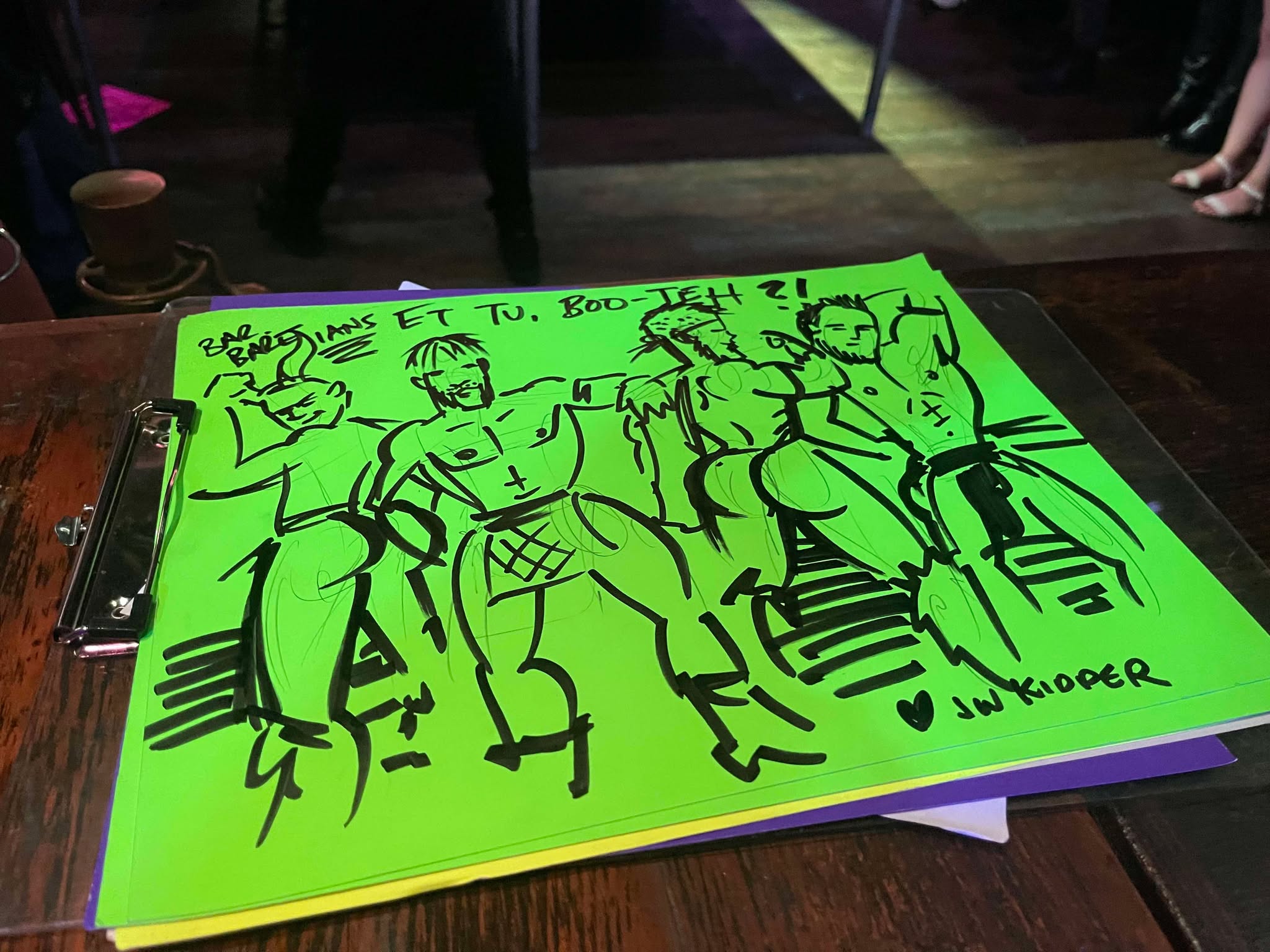
Work by Illustrator JW Kidder
LA-based veteran nightlife photographer Dusti Cunningham was feeling the spirits as he roamed around and captured the evening in his signature style, catching the crowd and the cast in their finest and sexiest.
After a short tally of the scores, De Hanno was crowned Mr. BarBareians 2025.
His winning personality and consistent talent across the categories, together with his winning assets, set him apart from his fellow contestants. In the end, everyone was a winner because the cast clearly had a good time and supported each other during the show.
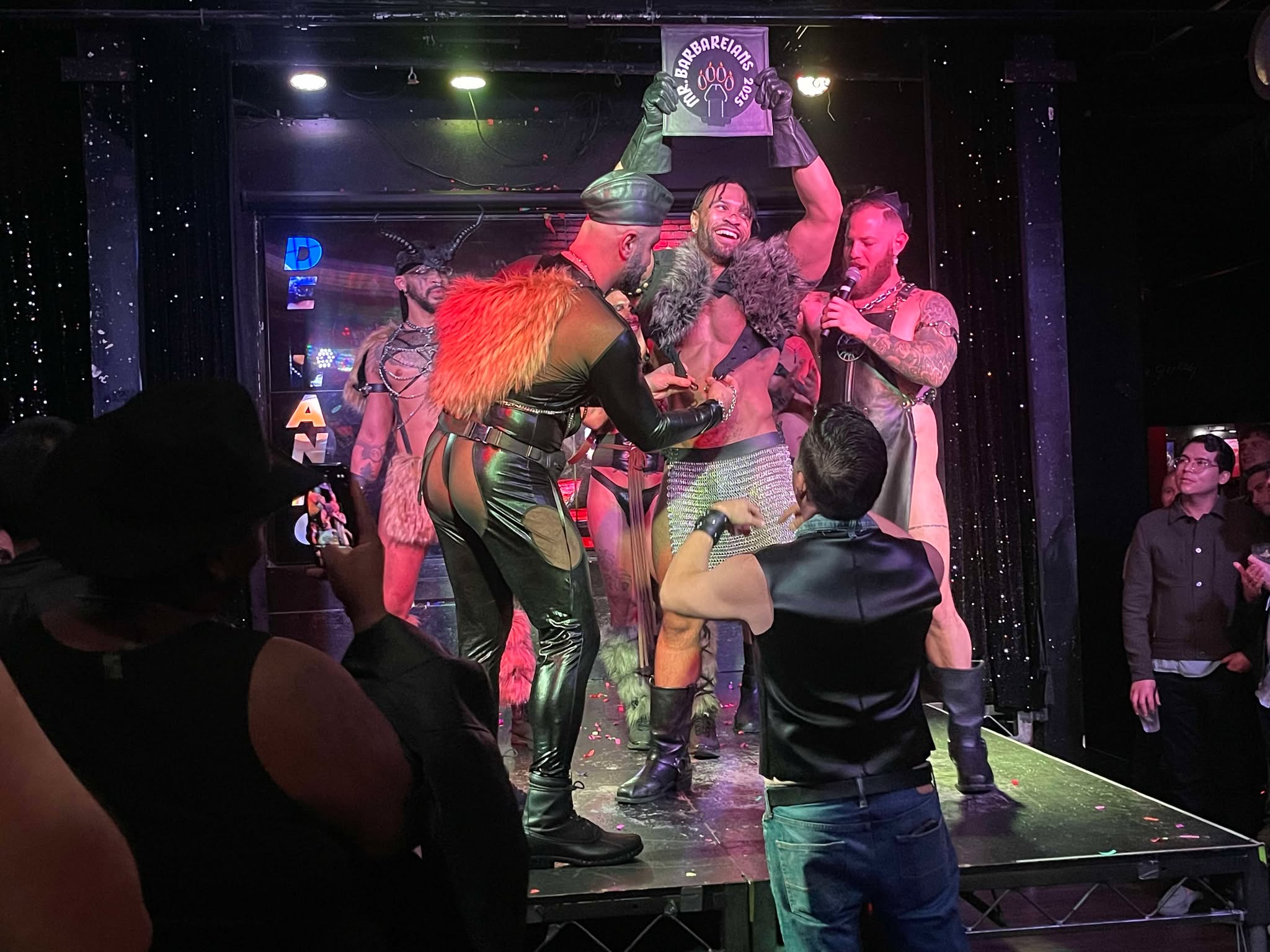
De Hanno named Mr. BarBareian 2025 / Photo by LA Blade
Precinct couldn’t have been a better venue to hold the event. Not only does it have ample space to accommodate the large crowd, but it has a great staff, stiff drinks, and stellar stage and lighting. We also love the sense of community here. Everyone is welcome under the club’s roof. Gay, straight, queer, trans, bears, twinks, leather lovers, and everything else under the sun. No one feels like an outcast or a stranger and it has become the ultimate safe space for the queer community in Los Angeles. This is how we should be congregating in fellowship, especially during these trying times. Precinct offers a great atmosphere for those who are looking to expand their experience past the Weho crowd (not that there is anything wrong with Weho, we are there all the time as well).
Mr. BarBareians and the BarBareians parties are produced by Hump Events, also responsible for Los Angeles’ Turbo for the dance crowd, Hump night celebrating the Middle Eastern community, and Steam for the cruisers. Like Precinct, they believe in representing the community and everyone is welcome.
Hats off to the first Mr. BarBareians, we will be waiting with our scorecard for next year!
a&e features
Pose’s Dyllón Burnside takes on most ambitious role yet in latest film
In this Blade exclusive, actor Dyllón Burnside gives us a candid look at his latest role
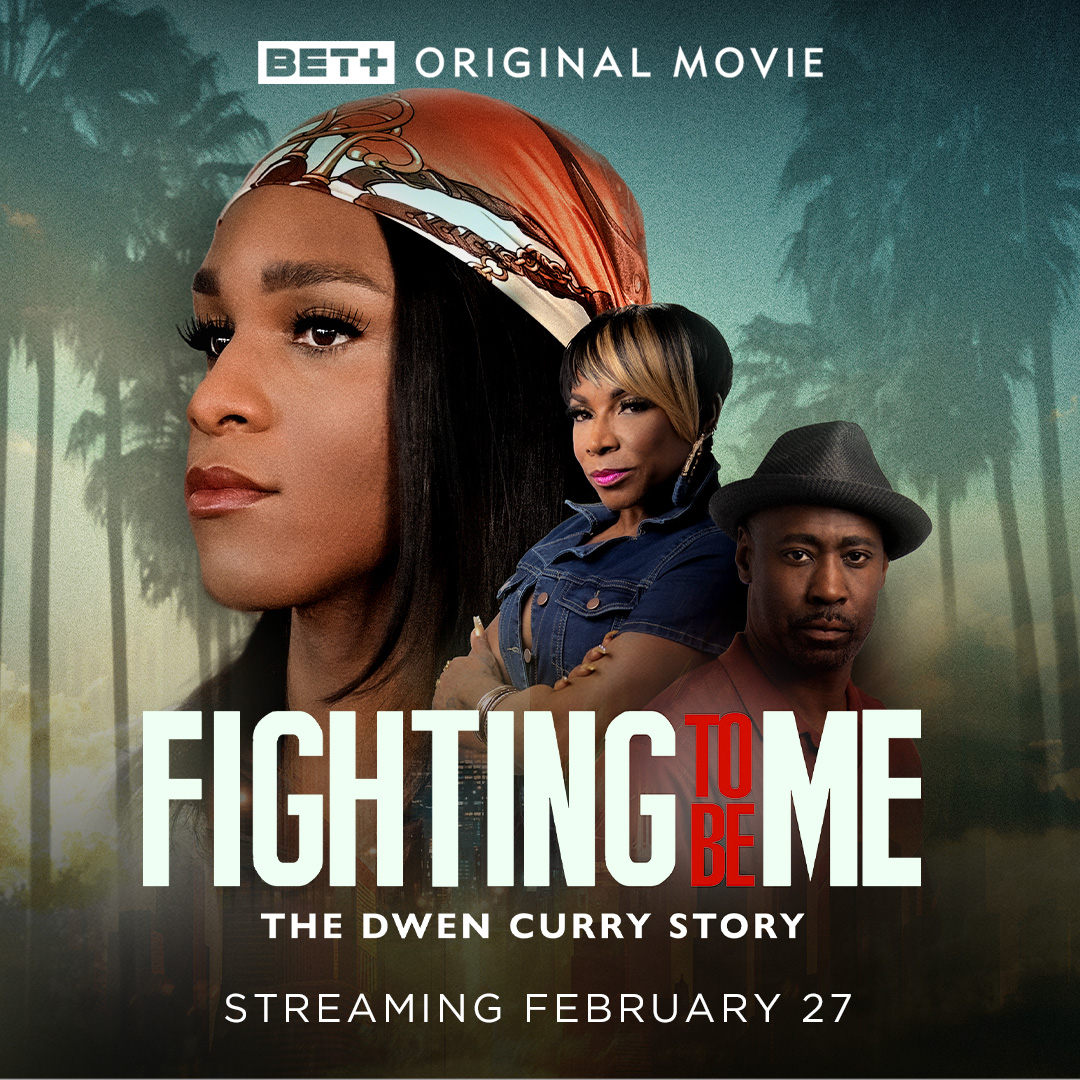
Actor Dyllón Burnside made an impressionable splash by playing Ricky Evangelista in FX’s Pose. Not only was he able to infuse sincerity and pathos into his role, but he has used his platform to speak against toxic masculinity, advocate for LGBTQ safe spaces and inspire activism.
Recently, he has partnered with BET+ for the film Fighting To Be Me, playing perhaps his most ambitious role to date. Dyllón plays Dwen Curry in a new biopic where he plays a celebrity stylist known for working with big names like Missy Elliott, DMX, Mariah Carey and more.
Leading a double life in many ways, Dwen also spearheaded a multi-million dollar fraud ring that came to be known as The Gay Gangsters. The film is part true crime, part Hollywood glam and all LGBTQ+ storytelling. The film is about family, identity, survival and self-acceptance as Dwen transitions from a gay man, to a proud transgender woman.
The film comes at a crucial time, where the nation is experiencing cutbacks in DEI initiatives that are affecting both the Black and the queer community. Fighting To Be Me is the latest in BET+’s efforts to highlight stories from the queer community.
Representing both the Black and queer communities in this film, it was essential for Dyllón to portray Dwen in a way that was both truthful and sincere.
We chatted with Dyllón ahead of the film’s premiere about his experience.
“It’s unlike any other project that I’ve been a part of. I have my processes and the things that I do as an actor to prepare that are my baseline. It’s rooted in my background in the theater and the things that I learned from my teachers in drama school and the different directors that I’ve worked with.”
But this process, while those things definitely helped Dyllón, there was so much of that, that Dyllón couldn’t pull from. He says he had to really stretch himself to immerse himself in Dwen’s story and world.
“I had a lot of conversations with her. It required me to be more curious than I think I’ve ever been in a role. I’m a seeker in that way, and I think that’s what I really love about working as an actor is really that process of discovery and getting curious and finding connections and doing the research. I love that kind of stuff.”
Dyllón was not familiar with Dwen’s story at first. After reading the script, he was compelled to tell her story, but it was imperative that he received the blessing from Dwen herself.
“I needed to have a conversation with her to make sure that she wanted me to play her. I wanted to be clear that this person, this trans person wants me to play them and they feel like I am the right person to portray them in this story. We had a beautiful conversation and it was that talk, just getting to look her in her eyes and understand her heart that made me decide I want to be a part of this project.”
Fighting To Be Me comes at a time when the nation is divided. Dyllón’s involvement as both the star and as one of the film’s executive producers is a testament to his belief that now is the time for this story to be shared.
“When we look at the times that we’re living in, when trans people are being attacked daily by the current administration, it is really troubling. The dehumanization of trans folks has gotten out of hand. I think we need to all have the opportunity to sit with the fact that my lived reality is not the same as someone else’s reality, but that doesn’t make their lived reality any less human or any less important or any less true.”
“I think that one of the beautiful things about this story is that it’s unlike any other story that I’ve ever heard or told. Yes, there’s the trans element, but it’s a full life story. It’s important to talk about trans issues as a means of advocacy. I’m also really interested in talking about Dwen Curry as a human being. What are the circumstances that conspired to create the situations that forced Dwen Curry to make the decisions that Dwen Curry made? We’re talking about the socioeconomic climate of the eighties. We’re talking about the politics of the eighties. We’re talking about HIV and AIDS. We’re talking about the stigma around being queer. We’re talking about poverty. All of these issues conspire to create a situation where the wind has to make certain decisions in order to survive and thrive.”
According to Dyllón, the story directly relates to what is happening right now. He elaborates:
“So many of us find ourselves in that position right now where there are all of these different systems and institutions that seem to be closing in around us and putting us between a rock and a hard place. We have to figure out how to stay true to ourselves. How do we protect ourselves? How do we eat? How do we stay safe from the cops shooting us down in the streets or from some person who hates us because of the color of our skin, or our gender or sexual identity? All of these things create a situation for people that drives them to make really hard decisions. And I think I’m more critical of those systems than I am the individual who is forced to exist in those systems.”
BET+’s inclusion of queer stories is a milestone. Typically, minority programming was resistant to talking about queer people. As part of that representation with Pose and now with this film, Dyllón has his take on the growing trend of inclusion.
“I may not say that minorities don’t celebrate folks, but I will say that historically we’ve seen that the media companies across the board have not supported stories. I think folks see we’re able to recognize the cultural impact as well as the fiscal benefits of telling more inclusive and expansive stories about who we are, who we get to be. I hope that continues. I hope we continue to see that in spite of all of the efforts to roll back DEI, and that media companies will stand firm in their commitment and desire to tell stories, real authentic stories about real authentic people.”
Totally giving himself over to the portrayal of Dwen on her journey of self-discovery and acceptance, Dyllón has started to look at his own relationship with identity and being true to himself. It is the message he has for himself, it is the message he has to his fans.
“One of the things that I’m really striving for in my life is integration, this idea that I don’t have to be a separate human being with my family that I am with my friends, that I am at work on set, that I am on stage, performing my music, that I am in the recording studio, that I am when I give a speech somewhere as the advocate in a political space. I don’t have to compartmentalize myself in those ways and I get to bring all of myself to every space that I’m in, even if that means I’m overwhelmed, or I’m tired, or I’m stressed, or I’m afraid.
The conversation that I’m having with myself in this moment, and by extension having with my audience, is this message around integration. And standing firmly 10 toes down in the truth of who I am and allowing that to be messy and allowing that to be uncertain and weird and to be unapologetic about the messiness and the weirdness and the lack of clarity.
Just show up as your full self wherever you find yourself and trust that your spirit will lead you and guide you in the way that you should go. Unplug from social media and get outside.”
Fighting to Be Me: The Dwen Curry Story is now available on BET+
Community Services - PSA
Heal in community at these upcoming mutual aid events
These upcoming events will donate proceeds to fire relief funds and directly impacted community members
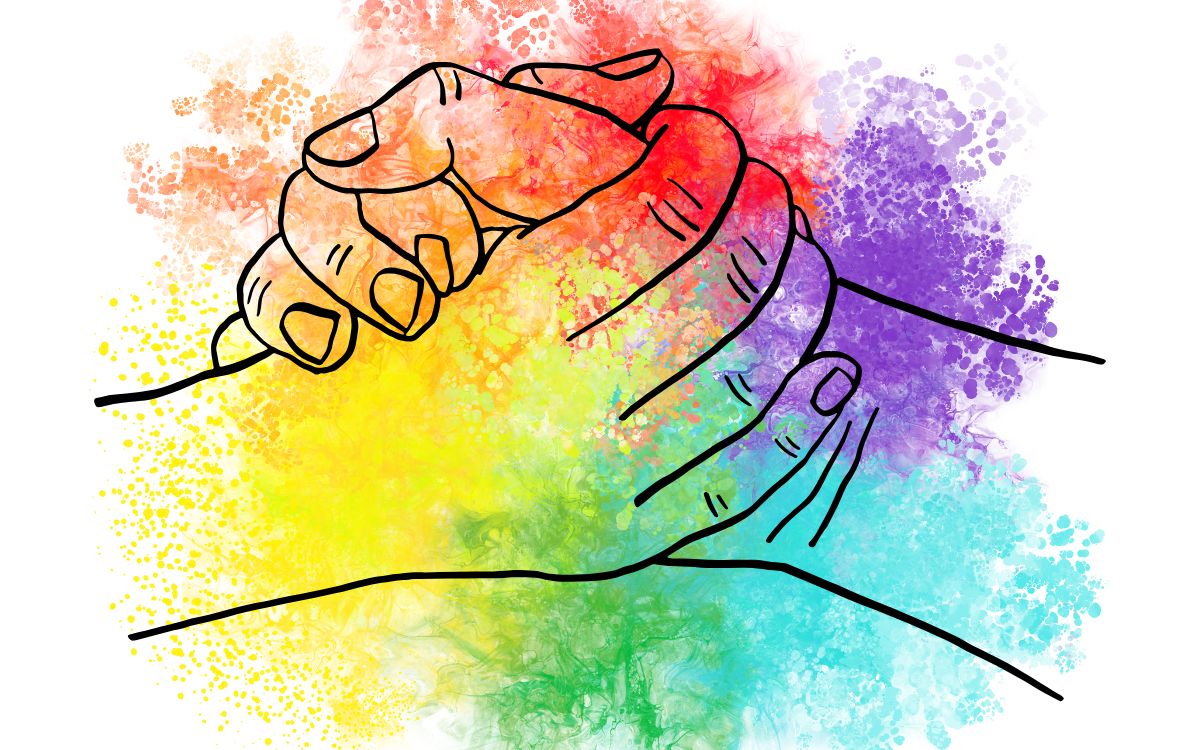
If you are in need of resources, services or just a distraction from the onslaught of devastating news, we’ve compiled a list of upcoming events and organizers who are helping heal the community.
Stud Country will be hosting an event at Club Bahia on Jan. 20, where they will make matched donations for dance lessons at 8:30 pm and 10 pm, in financial support of those affected by the LA fires. Stud Country is an event organizing brand aimed at preserving and celebrating the legacy of queer dance spaces and honoring the rich history of LGBTQ+ cowboy culture. They host regular events and dance lessons across San Francisco, New York City and Los Angeles.
Bar Flores LA will be hosting their weekly event, The World Is Our Oyster this Thursday, Jan. 23 at 7 pm, geared at uniting the queer community through drag, dancing, DJ sets, tarot readings and eating oysters. On their Instagram post, they stated that a percentage of the proceeds will be donated to the California fire relief efforts.
BabyGay, a nonprofit aimed at building inclusive community spaces, issued a statement through their newsletter saying that they had to evacuate from their home during the peak of the fires, unsure if they would ever be able to return.
“In times of crisis like this, our strength lies in our unity and ability to support one another,” said the statement.
BabyGay LA is hosting a LA Queer Events Coalition at Center Silverlake on Jan. 25 from 1pm to 3 pm. The event will be moderated by Carla Ibarra from the LA Civil Rights Department and hosted by Chanel and The Circus, as well as Miss Marquez from Empowerment in Heels. Together, they will guide the community through an afternoon focused on support and immediate assistance. They will also be offering support from on-site therapists by the Open Space Therapy Collective, grounding yoga led by With Love Projects, direct access to essential resources and services, and more.
Trans Dudes of LA, Yes Ma’am Club, Whxremones LA and The Gay Agenda LA are co-hosting a benefit fund called Back On Our Feet, at Sassafras Salon on Jan. 25 from 7 pm to 1am. On their Instagram, they posted that ‘100% of the sales will be donated to the organizations supporting victims of the current fires in Los Angeles.’The suggested donation is $5 for tickets that can be purchased through Eventbrite. According to their post, the night will feature drag, DJs and dancing.
Butchona will be bringing back their event to Little Joy Cocktails in Echo Park on Jan. 26 from 4 pm to 9 pm, featuring the OG DJ’s that brought this event to the queer Latin American community of LA, playing corridos, quebraditas, banda and more. They will also be featuring special guest DJ Todo Trankiloski, who’s part of the Chulita Vinyl Club – a DJ group who plays vinyl sets and recently celebrated 10 years of building their brand and QTBIPOC support system. Though the event is always free, they will be accepting donations for 2 families directly impacted by the Eaton Canyon fire, as well as CHIRLA, the Coalition for Humane Immigrant Rights, supporting the immigrant communities of LA.
Mariposx Healing will lead a Somatic Soothing Zoom event in collaboration with Liberatory Wellness Network and Pat.Radical.Therapist, for people affected by the L.A fires on Jan. 28 at 6pm.
“This session is for people affected by the Los Angeles fires. Azul of Mariposx Healing will hold space for expression of emotions through somatic practices, movement, chanting and drum medicine,” reads the IG post.
Perverse4Verse will host their next event on Jan. 30 at the Heavy Manners Library, with a $10 suggested donation and all proceeds going toward a fire relief fund for the community. The theme of the event is collective healing, as they will be featuring community organizers and poets who will be gathering to celebrate leather love and collective care through poetry, togetherness and education. This event is hosted by Karla Lamb, a well-known community organizer in queer literary spaces.
Butch Monthly LA is hosting a donation-based event on Jan. 31, from 6 pm to 8 pm at the Rediscover Center Mid City. They will be hosting a Zine-making night in collaboration with Rebuild, to fundraise for LA Fire relief which will be ‘open to butches and those who love them,’ according to their IG post.
Lesbian Goth Night postponed their monthly event set for Saturday Jan. 11, in light of the fires and devastation felt by many community members and their loved ones. They will now be holding the event on Feb. 7 at 9:30 pm to celebrate Valentine’s Day, honoring the tickets from January’s cancelled event and opening up sales to welcome more people.
“We understand that the weeks have been heavy, as we are too still processing the devastation surrounding the fires,” reads an Instagram post by Lesbian Goth Night. “We were very much looking forward to our January event and seeing all the new and familiar faces\, but throwing the event during that time didn’t feel right on many levels.
California Politics
Ysabel Jurado: A political maverick changing the narrative in LA politics
Jurado says it’s time for something different and she is it.
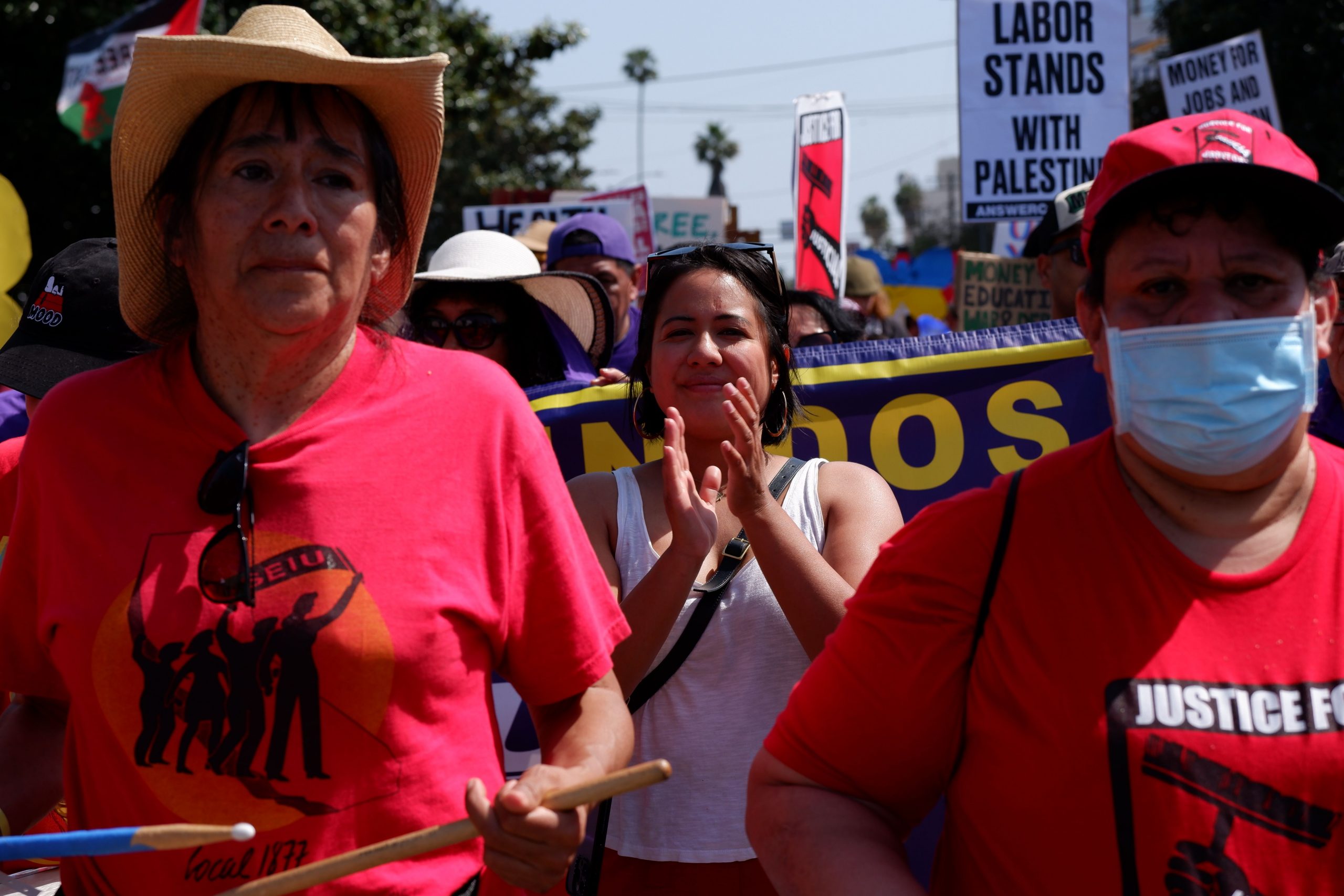
Tenant rights attorney Ysabel Jurado is known as the progressive, grassroots candidate in
the race for the hot seat that her opponent Kevin De León currently holds in Council District 14, even after years of recalls following a racism and homophobia scandal.
Jurado says it’s time for something different and she is it.
“I’m an API woman, I’m educated, I’m a citizen and English is my first language–
among others,” said Jurado in an interview with Los Angeles Blade. “And I’m also proud that on this team, we are largely led by LGBTQ+ folks, women of color, and people of color.”
As an out candidate, Jurado says she is intentional about the people she hires as part of
her campaign team. She is inclusive of nonbinary people and anyone who identifies as part of the QTBIPOC and LGBTQ+ acronyms, because she doesn’t just want to talk about them, she also wants to incorporate their lived experiences in her campaign mission. She says this in part
because of her own identity, but also because of the scandal that rocked De León’s political career.
The scandal follows various City Council members of CD-14 ranting about other BIPOC
members of Council and their LGBTQ+ families. The leaked audio recording included her
opponent De León — who at the time had his eyes set on running for mayor of Los Angeles.
“A lot of the groups talked about in these tapes are the people that we’ve recruited and
who we are making sure to build a coalition with,” said Jurado.
Going into this campaign race, she asked herself: ‘How do I go into this institution and
not become the worst parts of it?’
“If I ever become that, I want you to put my feet to the fire and shift me out of there,
because at that point I have betrayed myself,” responding to the question she had asked herself.
Jurado is currently facing backlash from many community members who support the
police force in Los Angeles, after she was elicited to respond to a question regarding her stance
on police funding. Some of those community members are now actively pushing for her to drop out of the race for Council District 14.
According to NBC4, family members of fallen Los Angeles Police Department officers
have spoken out to say they worry the remarks she made in regards to her stance on police
funding would hurt the LAPD’s ability to recruit new officers.
“In a meeting with students at Cal State LA, I quoted a lyric from a song that’s been part
of a larger conversation on systemic injustice and police accountability for decades…,” said
Jurado to NBC4.
Later, other news outlets reported that the person who elicited the ‘f-ck the police,’
response from Jurado, was a staffer working for De León.
“When you look at what I say and when you look at what I’m doing, I walk the walk and
I’m not going to take any bullshit sitting down, even though [De León] tries,” said Jurado in an
interview.
Jurado has been campaigning for this position since last summer and has since made
dozens of headlines that suggest she is a political force to be reckoned with and has been
building gains in the mostly Latin American Council district. She also brings up the long and problematic history of candidates and elected officials who have resigned, been indicted for corruption, or who have been asked to ‘step down over shady backroom deals.’
“The focus isn’t about me and him and what petty back-and-forth things we say, it’s
about our communities and wanting to make sure we talk to voters and rising above. Because at the end of the day, it’s about the work,” said Jurado. “It’s not about the noise and trying to bring it back to who gets hurt by all these conversations, which are the constituents.”
Jurado is an out LGBTQ single mother and lifelong resident of Highland Park who has
tirelessly fought for tenant rights and protections during her time as a tenants’ rights attorney and housing justice advocate. She prides herself in being a self-made politician who started her journey at Pasadena City College, then earned her bachelor’s degree at University of California, Los Angeles and then went to law school.
Jurado then went on to fight gentrification-driven displacement and in her candidate
statement, she says she spends her days protecting neighborhoods from corrupt developers and politicians.
“This campaign is for ‘the other.’ Being a daughter of immigrants, or whatever your
identity is, you become fluent in two different modalities,” said Jurado. “You know what the
dominant culture is and what the non-dominant culture is and you learn how to navigate through it. I think that is a superpower our people have, people who have always been ‘othered.’
Jurado is currently canvassing in the community, leading up to the election with support from Hugo Soto-Martinez, LA City Council Member of CD-13 and Eunisses Hernandez, LA City Council Member CD-1.
Miscellaneous
Pope Francis meets with transgender, intersex Catholics
Meeting took place at pontiff’s Vatican residence on Oct. 12

Pope Francis met with a group of transgender and intersex Catholics and LGBTQ allies at the Vatican on Oct. 12.
During the meeting, participants shared their personal stories, urging the pope to support greater acceptance within the church and address its stance on gender-affirming care.
Sister Jeannine Gramick, one of the co-founders of New Ways Ministry, a U.S.-based Catholic organization advocating for LGBTQ people, arranged the meeting that took place at Casa Santa Marta, Francis’s residence in Vatican City.
The delegation that met with the pope included Nicole Santamaría, an intersex woman, Michael Sennett, a trans man, and Cynthia Herrick, a doctor who works in a gender medicine clinic. Over the course of more than an hour, they recounted to Francis their struggles with depression and suicide on their transition journey and emphasized the positive impact of gender-affirming care.
New Ways Ministry Executive Director Francis DeBernardo, who was present at the meeting, said Francis didn’t respond vocally so much, but, clutching his cross, looked “sincerely pained” as he listened to people describe their hardships and “nodded vigorously when they talked about how positive medical transition was for them.”
“He really thanked them. He was very grateful that he had this opportunity,” DeBernardo said.
The impetus for bringing the pope in direct conversation with trans and intersex people was the Vatican’s release of the “Dignitas Infinata” declaration in April. While the document emphasized the need for respect and dignity for all, it also condemned gender-affirming medical care, framing it as incompatible with human dignity.
Gramick, who had been corresponding with the pope and had met him with members of the New Ways Ministry last year, was disappointed by the declaration and proposed that he hear directly from trans and intersex Catholics about their experiences, to which he agreed.
“Part of the problem is that the Vatican documents had not consulted transgender, intersex people, or any of the medical professionals who work with them. So we were encouraging the pope to consult with people more and to view people’s stories,” DeBernardo said.
The participants in the meeting had previously shared their personal testimonies with a group of two dozen Catholic bishops in the U.S. earlier this year as part of New Ways Ministry’s efforts to educate church leaders about the experiences of LGBTQ people and to advocate for their full acceptance.
During the meeting, Gramick stressed to Francis that other Vatican officials must also listen to the voices of LGBTQ people. DeBernardo said the pope fully agreed with this suggestion.
DeBernardo believes that by accepting the invitation to meet the group and listening to the experiences of trans and intersex people, Francis was deliberately setting a precedent for other church leaders to engage more meaningfully with the LGBTQ community.
In its doctrine, the Catholic Church condemns any same-sex sexual relations and rejects same-sex marriage. However, under Francis, the church has generally adopted a more inclusive tone toward LGBTQ people. The Vatican last year reversed a 2015 absolute ban on trans people serving as godparents, and approved priests to bless same-sex couples — but not same-sex unions.
Two LGBTQ activists from Africa — Clare Byarugaba of Chapter Four Uganda and Rightify Ghana Director Ebenezer Peegah — met with Francis in August.
Community Services - PSA
LGBTQ+ voter education town hall held tonight in Los Angeles
Unique Women’s Coalition, Equality California and FLUX host discussion on upcoming election.
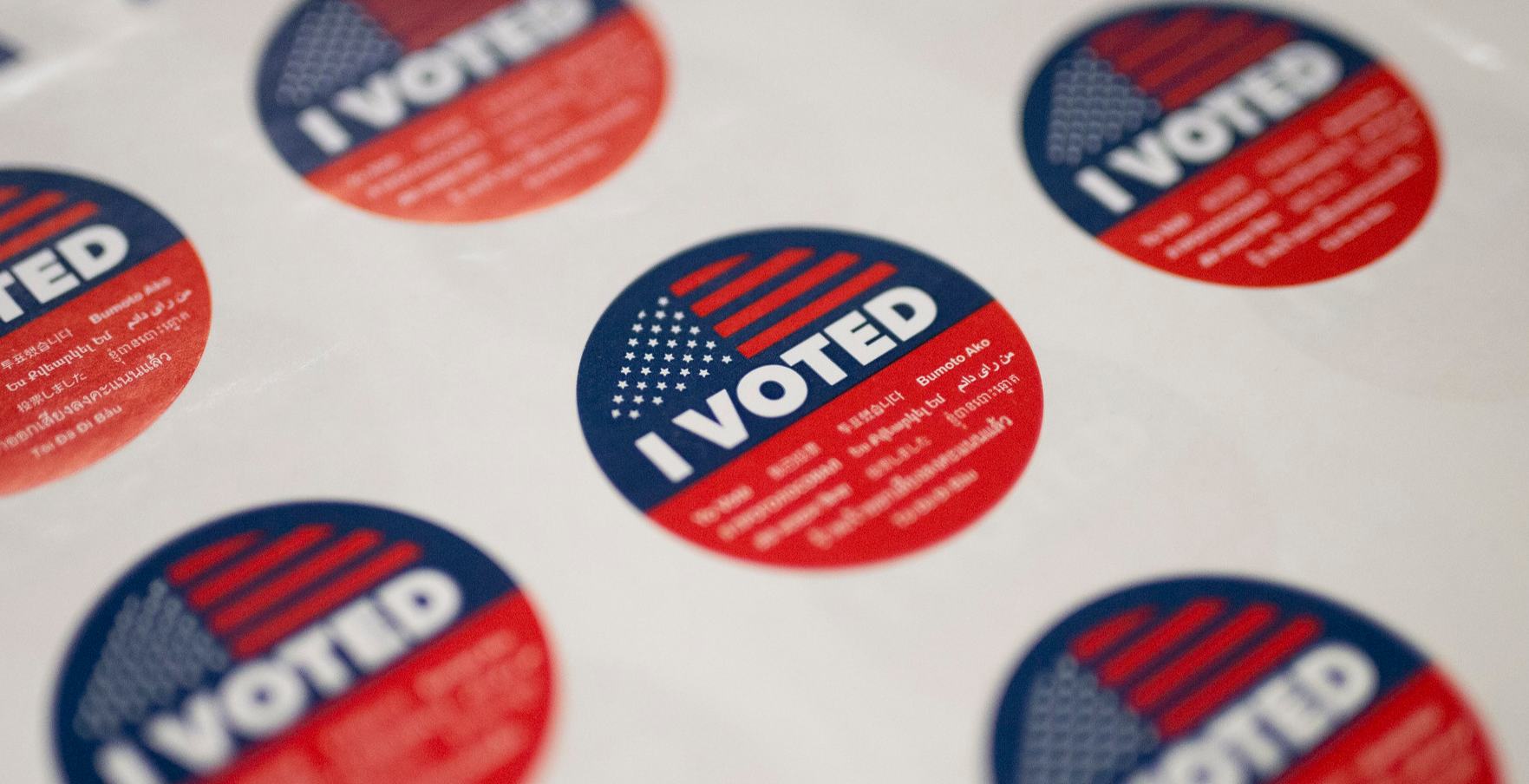
The Unique Women’s Coalition, Equality California and FLUX, a national division of the AIDS Healthcare Foundation, will host their second annual voter education town hall today at the Connie Norman Transgender Empowerment Center in Los Angeles from 7PM to 9PM tonight.
The organizations will present and discuss ballot propositions and measures that will appear on the November ballot and that affect the LGBTQ+ community in this part of the town hall series titled ‘The Issues.’
“The trans and nonbinary community is taking its seat at the table, and we are taking the time and space to be informed and prepare the voter base,” said Queen Victoria Ortega, international president of FLUX.
The town hall will feature conversations through a Q&A followed by a reception for program participants, organizational partners and LGBTQ+ city and county officials.
There will later be a third town hall before the election and The Connie Norman Transgender Empowerment Center will also become a voting location for anyone who feels like they need a safe space to vote, regardless of what voting district they are a part of.
“Our community is really asking for a place to talk about what all of this actually means because although we live in a blue sphere, housing and other forms of discrimination are still a very real threat,” said Scottie Jeanette Madden, director of advocacy at The Connie Norman Transgender Empowerment Center.
Miscellaneous
Chino Valley School District gender notification policy blocked by San Bernardino County Superior Court
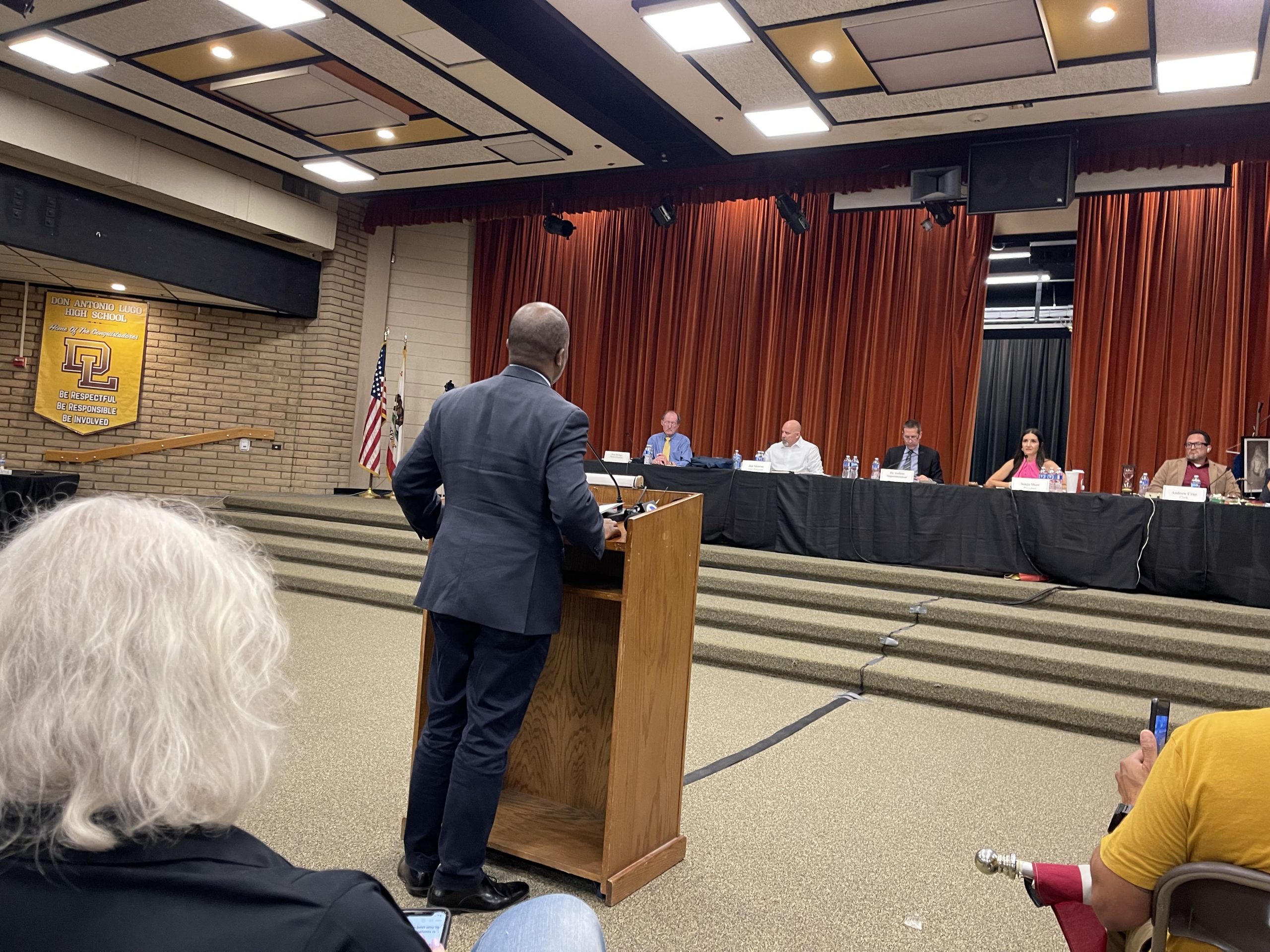
A San Bernardino County judge permanently blocked Chino Valley Unified school board’s policy requiring staff to disclose students’ gender identity to parents without consent.
Judge Michael A. Sachs ruled on September 9, 2024, that the notoriously anti-LGBTQ Chino Valley Unified school board‘s policy is discriminatory,permanently halting enforcement.
“The San Bernardino Superior Court’s decision to issue permanent injunctive and declaratory relief against the Chino Valley Unified School District Board of Education’s forced outing policy is a tremendous victory for LGBTQ+ youth, their families, and the entire Chino Valley community,” said executive director Tony Hoang, regarding the ruling. “This ruling acknowledges that every student deserves to feel safe, respected, and supported in their schools — without fear of being outed against their will.”
Earlier this year, California became the first state to ban gender notification policies after Gov. Gavin Newsom signed AB 1955 into law. The bill was previously The Support Academic Futures and Educators for Today’s Youth Act, or SAFETY Act.
This move was seemingly the last straw tieing Elon Musk to San Francisco, because shortly after the bill proposed by Assemblyman Chris Ward (D-San Diego) was signed into law, Musk announced that he was moving X and SpaceX operations out of California and into Texas.
Last Summer, Attorney General Rob Bonta addressed the Chino Valley Unified School District, urging them to protect student privacy and autonomy.
“By allowing for the disclosure of a student’s gender identity without their consent, Chino Valley Unified School District’s suggested Parental Notification policy would strip them of their freedom, violate their autonomy, and potentially put them in a harmful situation,” said Att. General Bonta in a statement. “Our schools should be protecting the rights of all students, especially those who are most vulnerable, and should be safeguarding students’ rights to fully participate in all educational and extracurricular opportunities.”
The Chino Valley USD policy required certified staff, school counselors and principals to inform students’ parents – with minimal exceptions – when a student requests to change their name, pronouns, access restroom facilities or joining athletic teams that do not align with their assigned gender at birth.
The Court initially granted a temporary restraining order and then a preliminary injunction, or ‘temporary relief,’ while the ruling was to be made.
The case document states that the Board of Directors voted 4-1 to adopt the policy.
The solo board member who voted against the policy stated that “shutting the door on students confiding to a staff member or a teacher, thereby preventing the school from being a ‘supporting place’ and that the ‘notification process’ was effectively throwing students back into the closet and slamming the door.”
The court document also states that “The Board did not cite or describe any statistical or qualitative evidence to support the policy, nor were the statements made considering alternative policies (including gender-neutral alternatives).
Liberty Justice Center, the conservative law firm that represented the district last year, then said it would appeal the decision to sue the district over the policy.
Chino Valley USD began enforcing the policy last summer and by March 7, rescinded it. By August, their continued attack on LGBTQ+ issues continued with their proposed ban on LGBTQ+ books, stating that they are “sexually obscene.”
Though the District rescinded the parental-notification policy, the Board continued to build a case for it and ultimately continued to stand by it.
Sonja Shaw, the Board’s president whose term expires in 2026, stated that she believed these parental notifications would ensure that gender non-conforming individuals would “get better.”
The justification for the policy was that it aided in fostering communication and trust between parents and the District.
The case document also states that the policy is for parents to exercise “effective control” over their children. It notes the Parham v J.R (1979) Supreme Court case where it indicated that parents’ rights can oftentimes trump over the rights of their children.
The court also referenced Mirabello v Olson (2023), a case brought forward by two religious teachers at Rincon Middle School who are in favor of the gender-notification policy being enforced in their district.
The judge ruled in favor of the teachers and stated that they could not be forced to “deceive parents about their children’s gender identity preferences.”
The court document for the case against Chino Valley USD further states however, that “although parents have undeniable rights, a determination that the Old Policy is unconstitutional does not directly infringe upon those rights.”
This means that parents’ rights to communication and trust with the Board of Education –as well as staff and faculty at their child’s school– is not under threat if this parental-notification policy is struck down permanently.
The relationship between parents and their children is not under threat.
The judge stated that “even if some infringement of parental rights occurs, the Court must still balance the competing equal protection interests and there are less restrictive means that restrict both.”
Books
Q&A with Chris Tompkins, author of “Raising LGBTQ Allies”
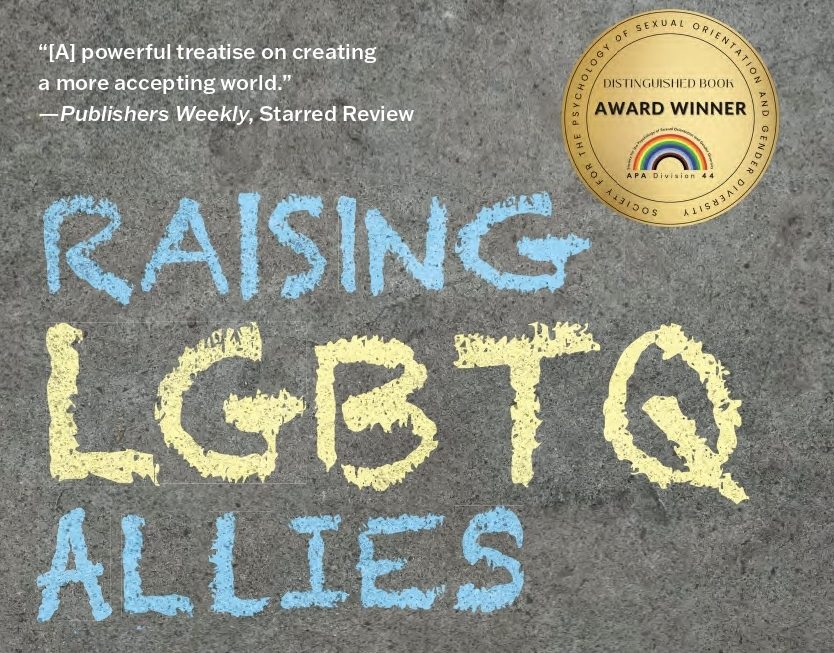
In an enlightening interview with the Los Angeles Blade, Chris Tompkins, author of “Raising LGBTQ Allies,” shares invaluable insights on fostering acceptance and understanding in families and communities. Tompkins, inspired by a personal experience with his young nephew, delves into the complexities of discussing gender and sexuality with children, addressing internalized biases, and the importance of proactive, open conversations. His book, which has garnered critical acclaim, offers a compassionate guide for parents, educators, and LGBTQ individuals alike, aiming to create a more inclusive world for future generations.
Los Angeles Blade: What inspired you to write “Raising LGBTQ Allies”?
Chris Tompkins: A question from my six-year-old nephew inspired me. Despite being out and supported by my family, he asked if a woman sitting next to me was my girlfriend. This made me realize that homophobia can be multilayered, sophisticated, and sometimes manifest as silence.
Los Angeles Blade: How did your upbringing influence your work?
Chris Tompkins: Growing up gay in a religious household, I struggled with my relationship with God. Reconnecting with my version of a “higher power” was transformative. My experiences teaching social-emotional learning and working with the LGBTQ community have shown me the importance of spirituality and self-love.
Los Angeles Blade: Why is your book important for LGBTQ community members, whether they have kids or not?
Chris Tompkins: It helped me realize my own responsibility in raising LGBTQ allies, even as a single, out-of-state uncle. The book encourages LGBTQ individuals to embody the change they want to see in younger generations.
Los Angeles Blade: Who could benefit from your book?
Chris Tompkins: While it’s titled for parents, “Raising LGBTQ Allies” is also a resource for LGBTQ community members to heal from trauma and toxic shame, especially given the current surge of anti-LGBTQ legislation.
Los Angeles Blade: Why is addressing trauma and shame important for the LGBTQ community?
Chris Tompkins: Trauma stems from chronic invalidation, which is common in the LGBTQ experience. Addressing these issues is crucial for mental, emotional, and spiritual wellbeing.
Los Angeles Blade: Can you explain the concept of trauma in the context of LGBTQ experiences?
Chris Tompkins: Trauma can be subtle and insidious, like the “thousand paper cuts” of chronic invalidation. Even in seemingly accepting environments, internalized shame can persist, affecting mental health and leading to coping mechanisms like substance abuse.
Los Angeles Blade: What is “Benign Neglect” and how does it relate to LGBTQ issues?
Chris Tompkins: “Benign Neglect” refers to the unintended consequences of not communicating about important issues. In LGBTQ contexts, it’s often manifested as parents avoiding discussions about gender and sexuality with children, which can inadvertently perpetuate shame and misunderstanding.
Los Angeles Blade: How can parents discuss sexuality with young children in LGBTQ-affirming ways?
Chris Tompkins: Include same-sex examples in everyday conversations and challenge gender stereotypes. Start these discussions early – children as young as six can understand these concepts when explained appropriately.
Los Angeles Blade: How can adults ensure a child has a healthy space for self-discovery?
Chris Tompkins: Be curious and create space for open, honest conversations. It’s our responsibility to learn who children are, not for them to teach us.
Los Angeles Blade: Any advice for adults uncomfortable with these conversations?
Chris Tompkins: Focus on keeping open, not keeping up. It’s okay to feel uncertain, but don’t let that prevent you from having these important discussions.
Los Angeles Blade: What’s your perspective on the recent surge of anti-LGBTQ legislation?
Chris Tompkins: It’s a countercultural dynamic, like a pendulum swinging back after progress. This emphasizes the importance of proactive conversations to challenge bias and raise allies.
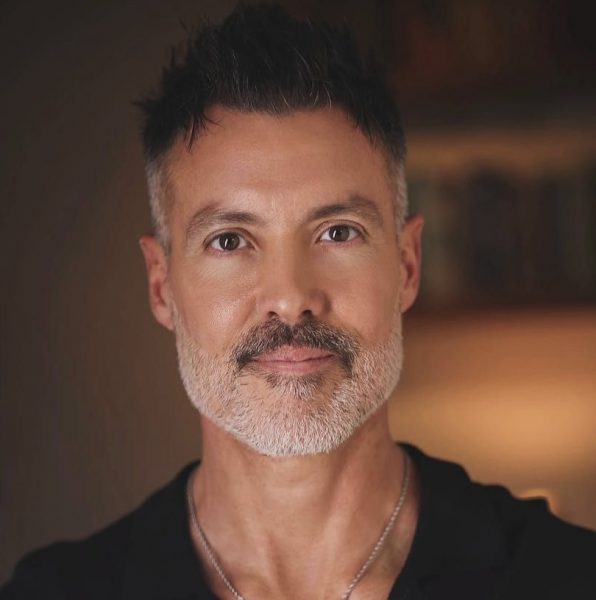
CHRIS TOMPKINS is an LGBTQ-affirming therapist who specializes in gay men’s identity and religious trauma.
Los Angeles Blade: Can you discuss problematic language in LGBTQ conversations?
Chris Tompkins: Words like “issues,” “lifestyle,” “different,” and “trend” can be harmful. They often carry subconscious bias and can unintentionally perpetuate the idea that being LGBTQ is a choice. It’s important to be mindful of our language.
Los Angeles Blade: How can we recognize and unravel our own biases?
Chris Tompkins: Start with self-reflection. Recognize that growing up in a heteronormative culture affects everyone’s beliefs. Consider the possibility that children in your life might be LGBTQ to help disrupt heteronormative thinking.
Los Angeles Blade: What are “messages from the playground”?
Chris Tompkins: It’s a metaphor for subconscious beliefs we pick up in childhood about gender, sexuality, and identity. These “messages” shape our worldview and can perpetuate shame if not addressed.
Los Angeles Blade: When and how should parents answer questions about where babies come from?
Chris Tompkins: Answer when children ask, as their curiosity indicates readiness. Use age-appropriate explanations. Discussing gender and sexuality early helps remove shame and fosters respect for these aspects of identity.
Los Angeles Blade: What’s the most important message you hope parents take from your book?
Chris Tompkins: This is a conversation for all parents, not just those with LGBTQ kids. Do the work yourself and maintain open, honest dialogues with your children.
Los Angeles Blade: How can readers engage more with your work?
Chris Tompkins: Visit my website, www.aroadtriptolove.com, or find me on Instagram: @aroadtriptolove.
Los Angeles Blade: What’s next for you and the book?
Chris Tompkins: “Raising LGBTQ Allies” has been published in Spanish and Vietnamese, with a paperback release on October 1st. It recently received the 2024 APA Distinguished Book Award, which will help it reach more readers, including educators and administrators.
Los Angeles Blade: Where can we find your book?
Chris Tompkins: It’s available wherever books are sold. You can pre-order the paperback edition now.
Los Angeles Blade: Any final advice?
Chris Tompkins: Don’t let fear of saying the wrong thing prevent you from speaking up. Ask for guidance, follow your heart, and remember that having these conversations is changing the narrative for future generations.
CHRIS TOMPKINS is an LGBTQ-affirming therapist who specializes in gay men’s identity and religious trauma. His work has been featured on TEDx, NBC, HuffPost, Psychology Today, the Advocate, and more. An uncle of five, Chris believes the privilege of a lifetime is being able to affirm all children for who they are. www.aroadtriptolove.com
Miscellaneous
African LGBTQ activists meet with Pope Francis
Pontiff met with Clare Byarugaba from Uganda and Ebenezer Peegah from Ghana
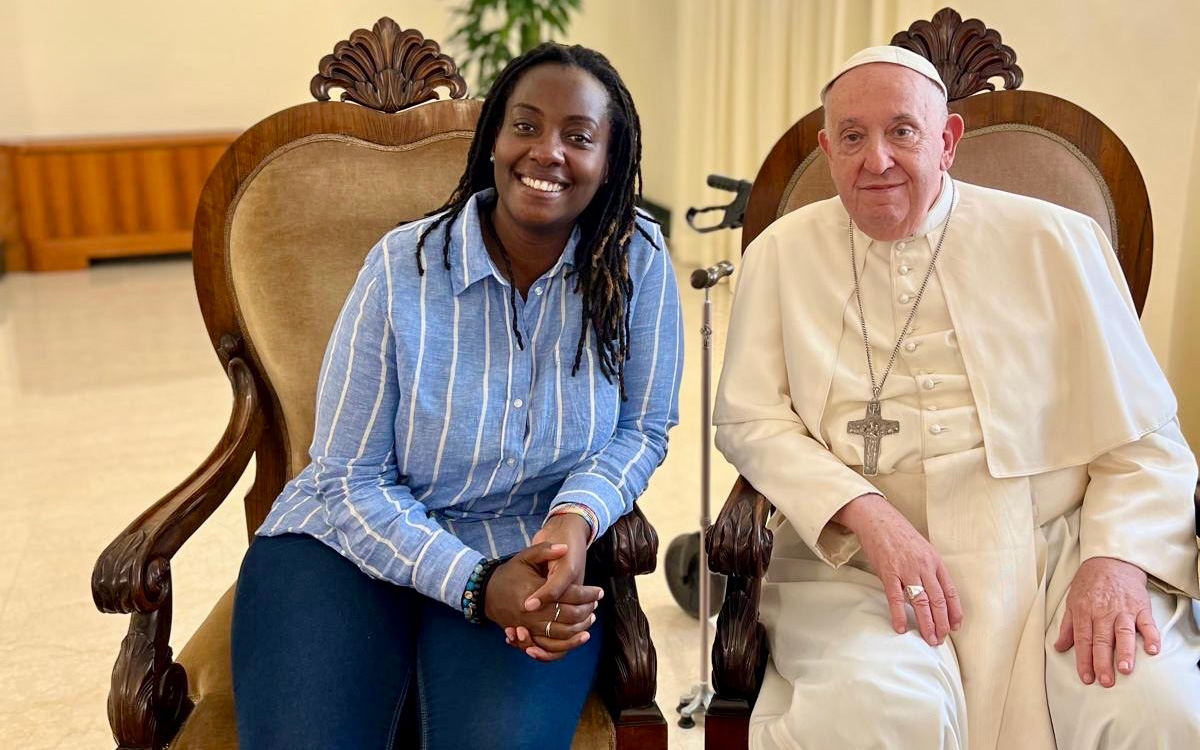
Pope Francis on Tuesday met with two LGBTQ activists from Africa at the Vatican.
Clare Byarugaba of Chapter Four Uganda posted to her X account a picture of her sitting next to Francis. A video that she shared shows Juan Carlos Cruz — a gay Chilean man who is a survivor of clergy sex abuse and a member of a commission that advises Francis on protecting children from pedophile priests — introducing her to the pontiff.
Cruz is also a member of the GLAAD board of directors.
Byarugaba, who also founded PFLAG Uganda, said she was “honored to meet” Francis. She added she briefed him on “the ruinous impact of Uganda’s two in a decade anti-LGBTIQ rights laws,” including the Anti-Homosexuality Act that President Yoweri Museveni signed in 2023, and “the gross human rights violations therein.”
“He reiterated discrimination is a sin and violence against LGBTIQ communities is unacceptable,” said Byarugaba.
The Washington Blade has reached out to Byarugaba for additional comment.
Francis on Tuesday also met with Rightify Ghana Director Ebenezer Peegah.
“With LGBTQI+ criminalization rising in Africa, and Ghana’s anti-LGBTQI+ bill pending, we shared our experiences as queer individuals in Ghana and expressed gratitude to the pope for his progressive stance, especially his opposition to violence and discrimination,” said Rightify Ghana on X. “Pope Francis encouraged us to ‘keep fighting for your rights,’ and that’s exactly what we will do.”
On Tuesday, August 14, 2024, Rightify Ghana’s Director @Ebenezer_Peegah had the honour of meeting Pope Francis @Pontifex at the Vatican.
With LGBTQI+ criminalisation rising in Africa, and Ghana’s anti-LGBTQI+ bill pending, we shared our experiences as queer individuals in.. pic.twitter.com/tYfW1X4W6D
— Rightify Ghana (@RightifyGhana) August 15, 2024
Francis during a Jan. 24, 2023, interview with the Associated Press said homosexuality is not a crime and laws that criminalize it are “unjust.” Francis a few days later reiterated these comments during a press conference on board his plane after it left South Sudan, a country that borders Uganda.
Consensual same-sex sexual relations remain criminalized in South Sudan.
“The criminalization of homosexuality is a problem that cannot be ignored,” Francis told reporters. “Criminalizing people with homosexual tendencies is an injustice.”
Uganda’s Anti-Homosexuality Act, among other things, contains a death penalty provision for “aggravated homosexuality.”
The U.S. after Museveni signed the law imposed visa restrictions on Ugandan officials and removed the country from a program that allows sub-Saharan African countries to trade duty-free with the U.S. The World Bank Group also announced the suspension of new loans to Uganda.
The Ugandan Constitutional Court on April 3 refused to “nullify the Anti-Homosexuality Act in its totality.”
More than a dozen activists appealed the ruling to the country’s Court of Appeal. They filed a second appeal with the Supreme Court on July 11.
Angola, Botswana, Mauritius, and Seychelles are among the countries that have decriminalized consensual same-sex sexual relations over the last decade.
The Namibian government last month appealed a ruling that struck down the country’s apartheid-era sodomy laws.
Burkina Faso’s military government on July 10 announced it plans to recriminalize consensual same-sex sexual relations in the nation. The Ghanaian Supreme Court on July 24 upheld the country’s colonial-era sodomy law.
Ghanaian lawmakers on Feb. 28 approved the Promotion of Proper Human Sexual Rights and Ghanaian Family Values Bill that would, among other things, criminalize allyship. President Nana Akufo-Addo has said he will not sign the bill until the Supreme Court rules on whether it is constitutional or not.
-
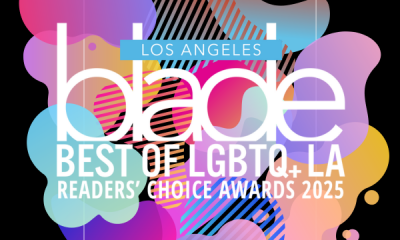
 Arts & Entertainment4 days ago
Arts & Entertainment4 days ago2025 Best of LGBTQ LA Finalist Voting
-

 Bars & Parties2 days ago
Bars & Parties2 days agoBear World Magazine gives the bear community a mighty roar
-

 Features2 days ago
Features2 days agoMeet the new co-presidents of the NLGJA LA Chapter
-

 a&e features3 days ago
a&e features3 days agoAnthony Nunziata Performs the Great Palm Springs Songbook
-
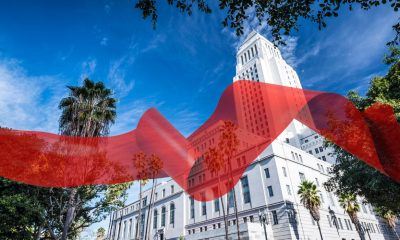
 Local5 days ago
Local5 days ago‘Housing Now!’: Advocates plan to wrap City Hall in red tape
-
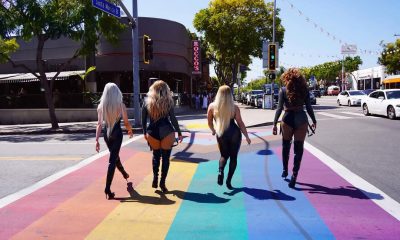
 Bars & Parties3 days ago
Bars & Parties3 days agoRocco’s 2.0 is looking to the past to celebrate the future
-

 Congress3 days ago
Congress3 days agoDemocratic lawmakers travel to El Salvador, demand information about gay Venezuelan asylum seeker
-

 Events2 days ago
Events2 days agoCelebrate Lesbian Visibility Week with The Curve Foundation
-
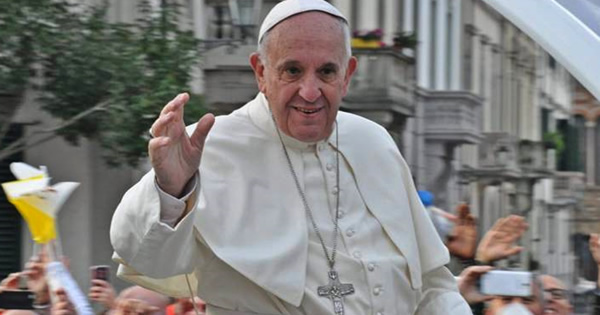
 Commentary3 days ago
Commentary3 days agoOn Pope Francis, Opus Dei and ongoing religious intolerance
-

 The Vatican5 days ago
The Vatican5 days agoPope Francis dies at 88

